Uber: Globalization Impacts and Corporate Governance Challenges
VerifiedAdded on 2023/01/16
|7
|1626
|60
Report
AI Summary
This memorandum analyzes the impacts of globalization on Uber, focusing on its corporate governance challenges. It examines how globalization has expanded business horizons but also intensified competition, affecting local businesses. The report identifies specific problems within Uber, such as driver verification issues, data privacy breaches, and unprofessional conduct, which have led to regulatory actions and reputational damage. A PESTEL analysis is used to assess the political, economic, social, technological, environmental, and legal factors influencing Uber's global operations. The report highlights the importance of good corporate governance in navigating globalization, referencing international institutions like the IMF, WTO, and World Bank and their roles in promoting fair trade and business expansion. The conclusion emphasizes that Uber's failure to uphold good corporate governance has resulted in market share losses and operational challenges, despite its initial success in the global market. The report cites relevant literature and reports to support its findings.
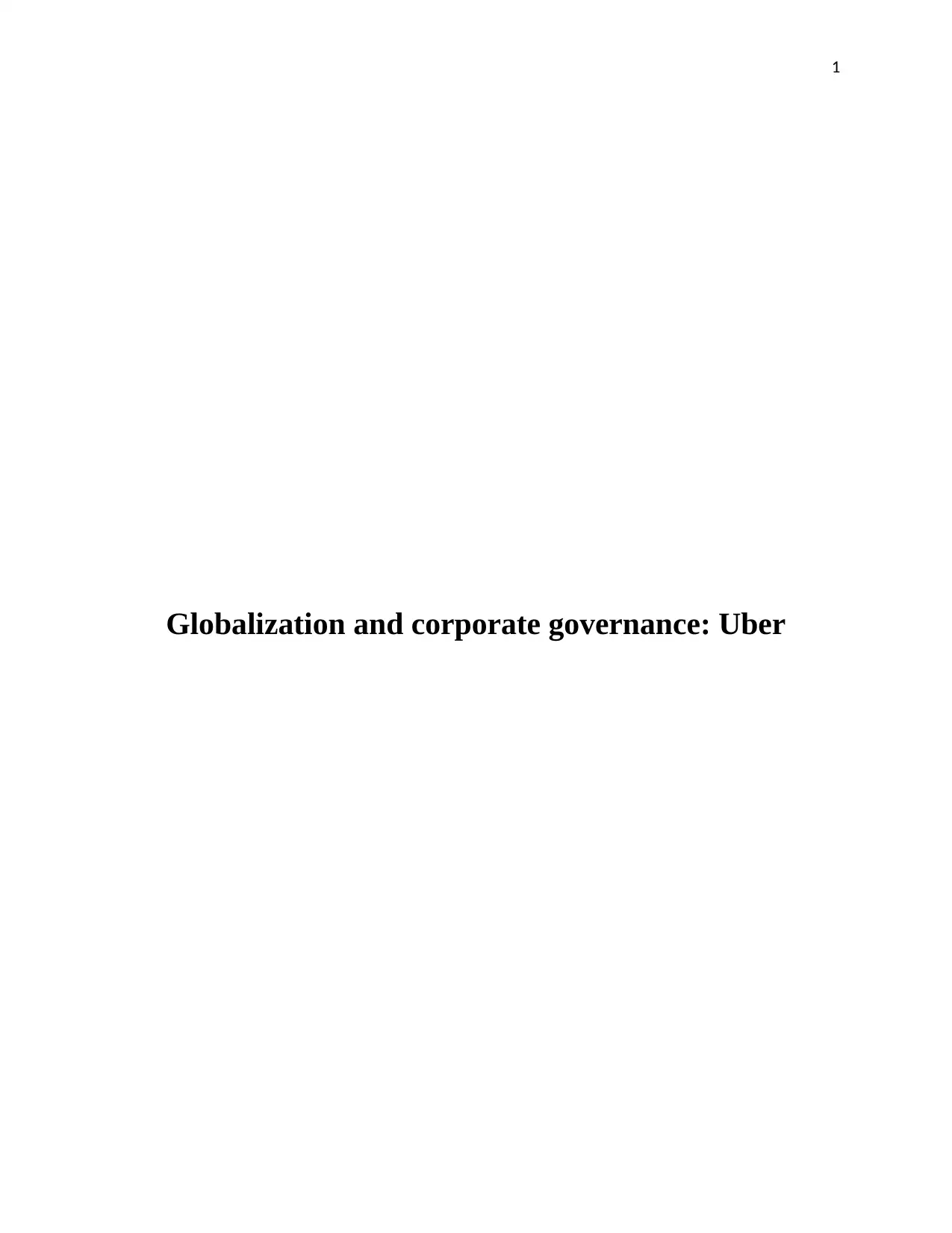
1
Globalization and corporate governance: Uber
Globalization and corporate governance: Uber
Paraphrase This Document
Need a fresh take? Get an instant paraphrase of this document with our AI Paraphraser
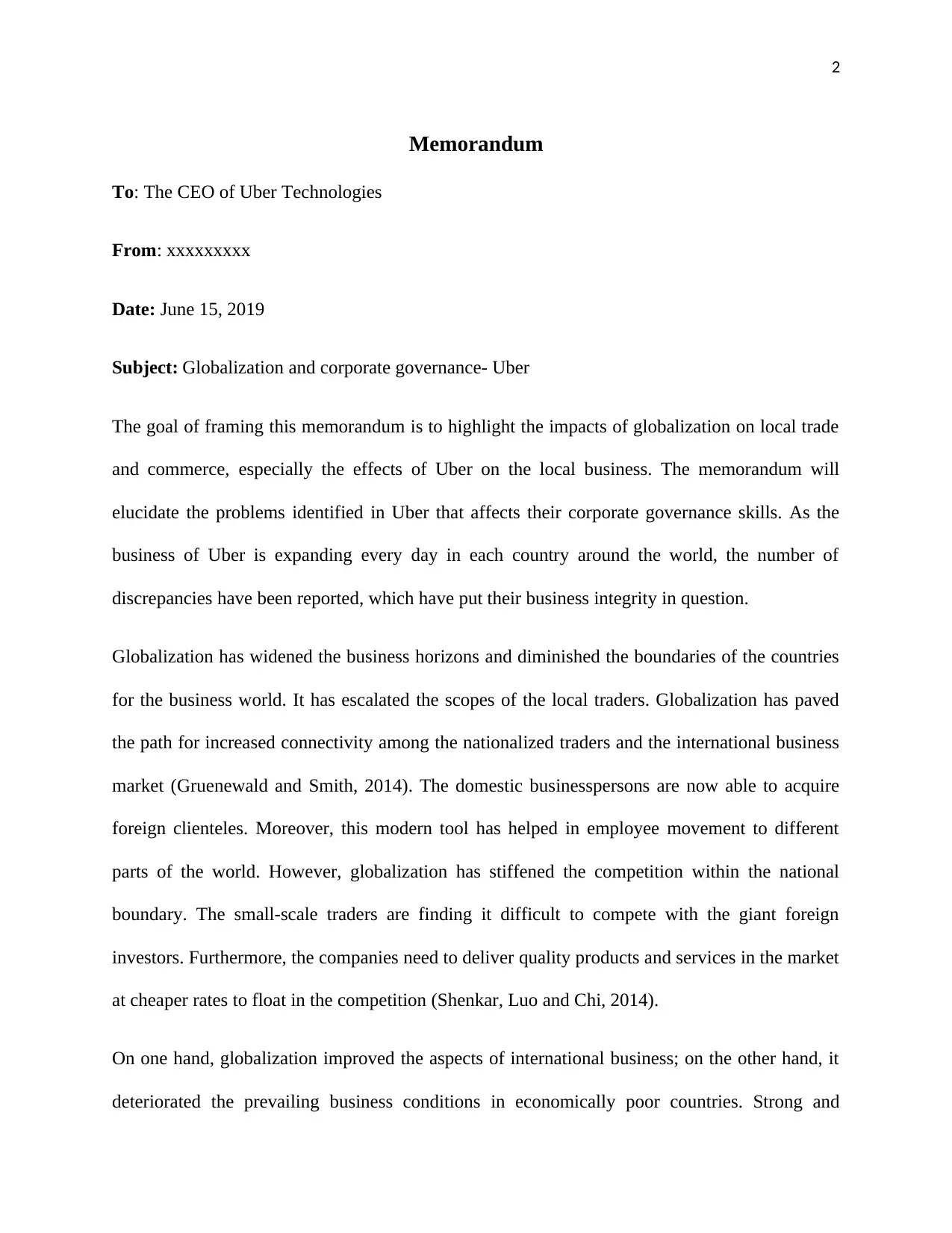
2
Memorandum
To: The CEO of Uber Technologies
From: xxxxxxxxx
Date: June 15, 2019
Subject: Globalization and corporate governance- Uber
The goal of framing this memorandum is to highlight the impacts of globalization on local trade
and commerce, especially the effects of Uber on the local business. The memorandum will
elucidate the problems identified in Uber that affects their corporate governance skills. As the
business of Uber is expanding every day in each country around the world, the number of
discrepancies have been reported, which have put their business integrity in question.
Globalization has widened the business horizons and diminished the boundaries of the countries
for the business world. It has escalated the scopes of the local traders. Globalization has paved
the path for increased connectivity among the nationalized traders and the international business
market (Gruenewald and Smith, 2014). The domestic businesspersons are now able to acquire
foreign clienteles. Moreover, this modern tool has helped in employee movement to different
parts of the world. However, globalization has stiffened the competition within the national
boundary. The small-scale traders are finding it difficult to compete with the giant foreign
investors. Furthermore, the companies need to deliver quality products and services in the market
at cheaper rates to float in the competition (Shenkar, Luo and Chi, 2014).
On one hand, globalization improved the aspects of international business; on the other hand, it
deteriorated the prevailing business conditions in economically poor countries. Strong and
Memorandum
To: The CEO of Uber Technologies
From: xxxxxxxxx
Date: June 15, 2019
Subject: Globalization and corporate governance- Uber
The goal of framing this memorandum is to highlight the impacts of globalization on local trade
and commerce, especially the effects of Uber on the local business. The memorandum will
elucidate the problems identified in Uber that affects their corporate governance skills. As the
business of Uber is expanding every day in each country around the world, the number of
discrepancies have been reported, which have put their business integrity in question.
Globalization has widened the business horizons and diminished the boundaries of the countries
for the business world. It has escalated the scopes of the local traders. Globalization has paved
the path for increased connectivity among the nationalized traders and the international business
market (Gruenewald and Smith, 2014). The domestic businesspersons are now able to acquire
foreign clienteles. Moreover, this modern tool has helped in employee movement to different
parts of the world. However, globalization has stiffened the competition within the national
boundary. The small-scale traders are finding it difficult to compete with the giant foreign
investors. Furthermore, the companies need to deliver quality products and services in the market
at cheaper rates to float in the competition (Shenkar, Luo and Chi, 2014).
On one hand, globalization improved the aspects of international business; on the other hand, it
deteriorated the prevailing business conditions in economically poor countries. Strong and
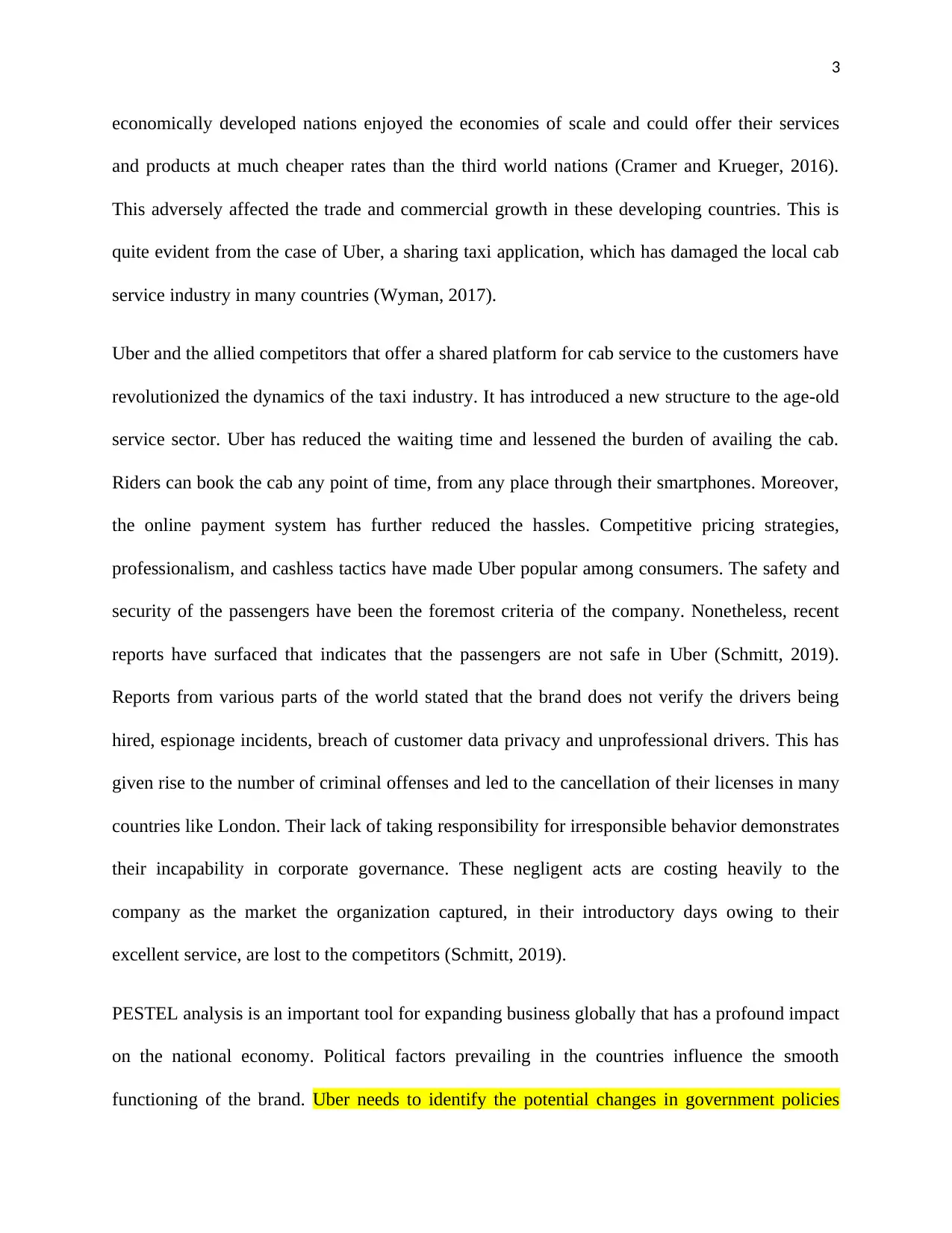
3
economically developed nations enjoyed the economies of scale and could offer their services
and products at much cheaper rates than the third world nations (Cramer and Krueger, 2016).
This adversely affected the trade and commercial growth in these developing countries. This is
quite evident from the case of Uber, a sharing taxi application, which has damaged the local cab
service industry in many countries (Wyman, 2017).
Uber and the allied competitors that offer a shared platform for cab service to the customers have
revolutionized the dynamics of the taxi industry. It has introduced a new structure to the age-old
service sector. Uber has reduced the waiting time and lessened the burden of availing the cab.
Riders can book the cab any point of time, from any place through their smartphones. Moreover,
the online payment system has further reduced the hassles. Competitive pricing strategies,
professionalism, and cashless tactics have made Uber popular among consumers. The safety and
security of the passengers have been the foremost criteria of the company. Nonetheless, recent
reports have surfaced that indicates that the passengers are not safe in Uber (Schmitt, 2019).
Reports from various parts of the world stated that the brand does not verify the drivers being
hired, espionage incidents, breach of customer data privacy and unprofessional drivers. This has
given rise to the number of criminal offenses and led to the cancellation of their licenses in many
countries like London. Their lack of taking responsibility for irresponsible behavior demonstrates
their incapability in corporate governance. These negligent acts are costing heavily to the
company as the market the organization captured, in their introductory days owing to their
excellent service, are lost to the competitors (Schmitt, 2019).
PESTEL analysis is an important tool for expanding business globally that has a profound impact
on the national economy. Political factors prevailing in the countries influence the smooth
functioning of the brand. Uber needs to identify the potential changes in government policies
economically developed nations enjoyed the economies of scale and could offer their services
and products at much cheaper rates than the third world nations (Cramer and Krueger, 2016).
This adversely affected the trade and commercial growth in these developing countries. This is
quite evident from the case of Uber, a sharing taxi application, which has damaged the local cab
service industry in many countries (Wyman, 2017).
Uber and the allied competitors that offer a shared platform for cab service to the customers have
revolutionized the dynamics of the taxi industry. It has introduced a new structure to the age-old
service sector. Uber has reduced the waiting time and lessened the burden of availing the cab.
Riders can book the cab any point of time, from any place through their smartphones. Moreover,
the online payment system has further reduced the hassles. Competitive pricing strategies,
professionalism, and cashless tactics have made Uber popular among consumers. The safety and
security of the passengers have been the foremost criteria of the company. Nonetheless, recent
reports have surfaced that indicates that the passengers are not safe in Uber (Schmitt, 2019).
Reports from various parts of the world stated that the brand does not verify the drivers being
hired, espionage incidents, breach of customer data privacy and unprofessional drivers. This has
given rise to the number of criminal offenses and led to the cancellation of their licenses in many
countries like London. Their lack of taking responsibility for irresponsible behavior demonstrates
their incapability in corporate governance. These negligent acts are costing heavily to the
company as the market the organization captured, in their introductory days owing to their
excellent service, are lost to the competitors (Schmitt, 2019).
PESTEL analysis is an important tool for expanding business globally that has a profound impact
on the national economy. Political factors prevailing in the countries influence the smooth
functioning of the brand. Uber needs to identify the potential changes in government policies
⊘ This is a preview!⊘
Do you want full access?
Subscribe today to unlock all pages.

Trusted by 1+ million students worldwide
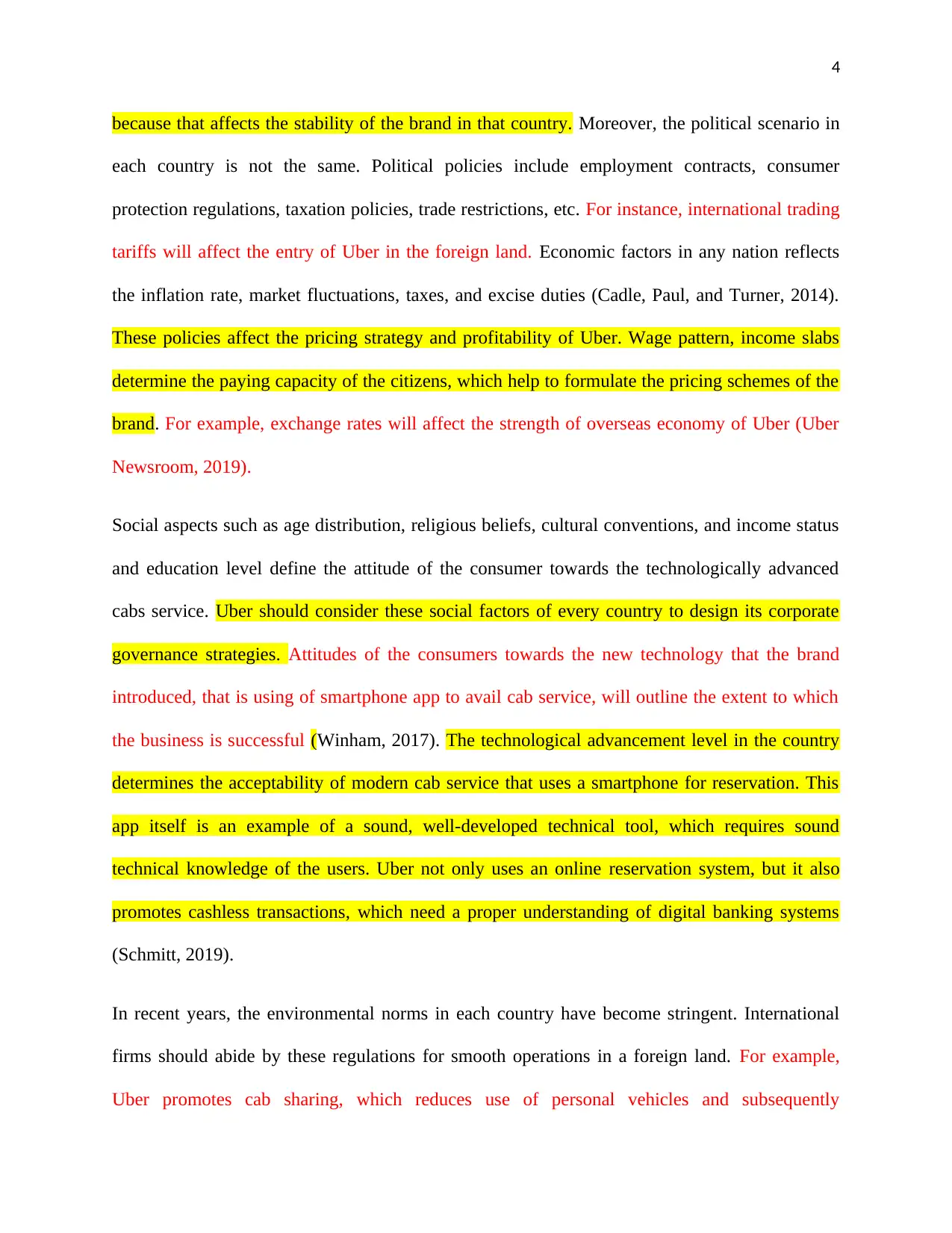
4
because that affects the stability of the brand in that country. Moreover, the political scenario in
each country is not the same. Political policies include employment contracts, consumer
protection regulations, taxation policies, trade restrictions, etc. For instance, international trading
tariffs will affect the entry of Uber in the foreign land. Economic factors in any nation reflects
the inflation rate, market fluctuations, taxes, and excise duties (Cadle, Paul, and Turner, 2014).
These policies affect the pricing strategy and profitability of Uber. Wage pattern, income slabs
determine the paying capacity of the citizens, which help to formulate the pricing schemes of the
brand. For example, exchange rates will affect the strength of overseas economy of Uber (Uber
Newsroom, 2019).
Social aspects such as age distribution, religious beliefs, cultural conventions, and income status
and education level define the attitude of the consumer towards the technologically advanced
cabs service. Uber should consider these social factors of every country to design its corporate
governance strategies. Attitudes of the consumers towards the new technology that the brand
introduced, that is using of smartphone app to avail cab service, will outline the extent to which
the business is successful (Winham, 2017). The technological advancement level in the country
determines the acceptability of modern cab service that uses a smartphone for reservation. This
app itself is an example of a sound, well-developed technical tool, which requires sound
technical knowledge of the users. Uber not only uses an online reservation system, but it also
promotes cashless transactions, which need a proper understanding of digital banking systems
(Schmitt, 2019).
In recent years, the environmental norms in each country have become stringent. International
firms should abide by these regulations for smooth operations in a foreign land. For example,
Uber promotes cab sharing, which reduces use of personal vehicles and subsequently
because that affects the stability of the brand in that country. Moreover, the political scenario in
each country is not the same. Political policies include employment contracts, consumer
protection regulations, taxation policies, trade restrictions, etc. For instance, international trading
tariffs will affect the entry of Uber in the foreign land. Economic factors in any nation reflects
the inflation rate, market fluctuations, taxes, and excise duties (Cadle, Paul, and Turner, 2014).
These policies affect the pricing strategy and profitability of Uber. Wage pattern, income slabs
determine the paying capacity of the citizens, which help to formulate the pricing schemes of the
brand. For example, exchange rates will affect the strength of overseas economy of Uber (Uber
Newsroom, 2019).
Social aspects such as age distribution, religious beliefs, cultural conventions, and income status
and education level define the attitude of the consumer towards the technologically advanced
cabs service. Uber should consider these social factors of every country to design its corporate
governance strategies. Attitudes of the consumers towards the new technology that the brand
introduced, that is using of smartphone app to avail cab service, will outline the extent to which
the business is successful (Winham, 2017). The technological advancement level in the country
determines the acceptability of modern cab service that uses a smartphone for reservation. This
app itself is an example of a sound, well-developed technical tool, which requires sound
technical knowledge of the users. Uber not only uses an online reservation system, but it also
promotes cashless transactions, which need a proper understanding of digital banking systems
(Schmitt, 2019).
In recent years, the environmental norms in each country have become stringent. International
firms should abide by these regulations for smooth operations in a foreign land. For example,
Uber promotes cab sharing, which reduces use of personal vehicles and subsequently
Paraphrase This Document
Need a fresh take? Get an instant paraphrase of this document with our AI Paraphraser
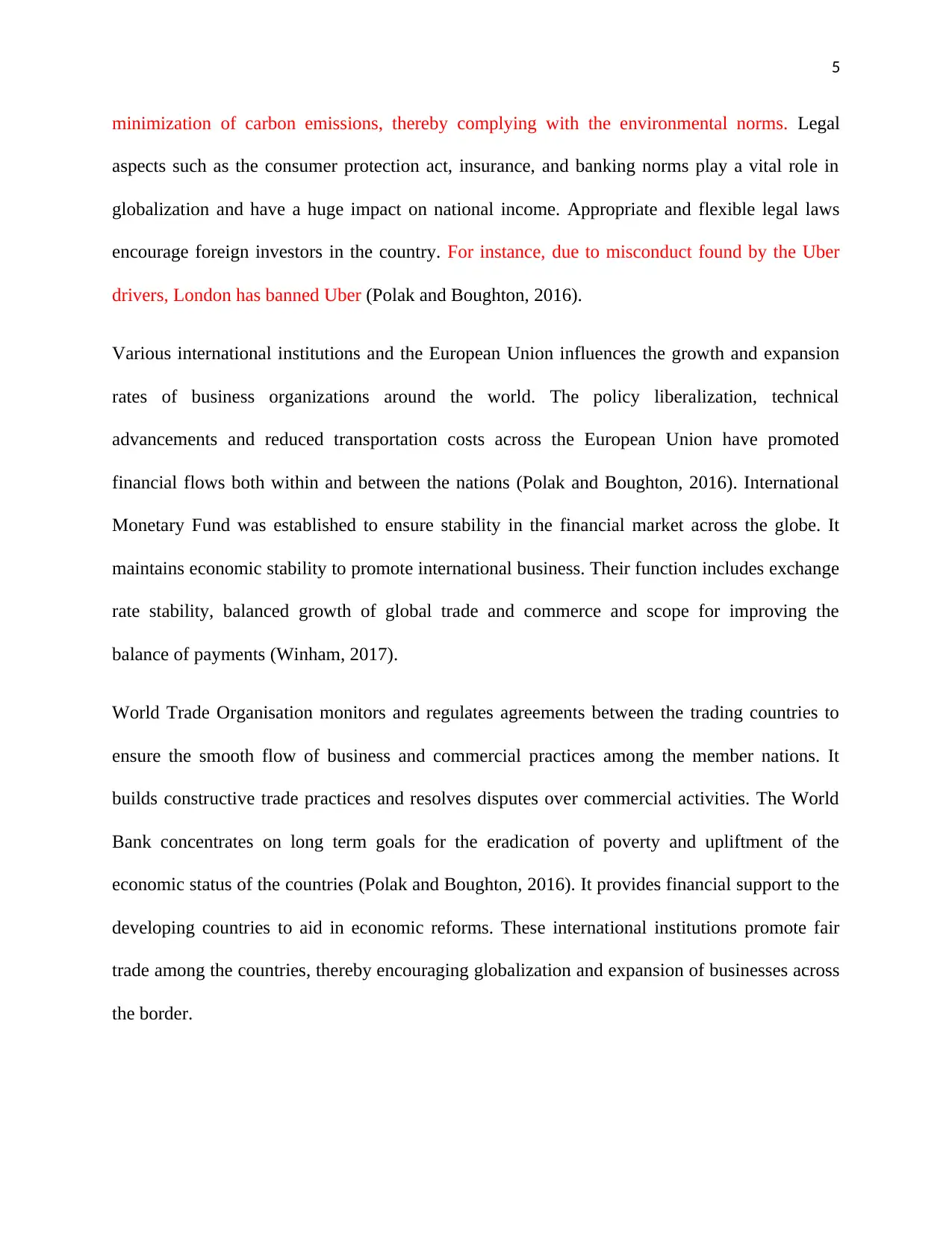
5
minimization of carbon emissions, thereby complying with the environmental norms. Legal
aspects such as the consumer protection act, insurance, and banking norms play a vital role in
globalization and have a huge impact on national income. Appropriate and flexible legal laws
encourage foreign investors in the country. For instance, due to misconduct found by the Uber
drivers, London has banned Uber (Polak and Boughton, 2016).
Various international institutions and the European Union influences the growth and expansion
rates of business organizations around the world. The policy liberalization, technical
advancements and reduced transportation costs across the European Union have promoted
financial flows both within and between the nations (Polak and Boughton, 2016). International
Monetary Fund was established to ensure stability in the financial market across the globe. It
maintains economic stability to promote international business. Their function includes exchange
rate stability, balanced growth of global trade and commerce and scope for improving the
balance of payments (Winham, 2017).
World Trade Organisation monitors and regulates agreements between the trading countries to
ensure the smooth flow of business and commercial practices among the member nations. It
builds constructive trade practices and resolves disputes over commercial activities. The World
Bank concentrates on long term goals for the eradication of poverty and upliftment of the
economic status of the countries (Polak and Boughton, 2016). It provides financial support to the
developing countries to aid in economic reforms. These international institutions promote fair
trade among the countries, thereby encouraging globalization and expansion of businesses across
the border.
minimization of carbon emissions, thereby complying with the environmental norms. Legal
aspects such as the consumer protection act, insurance, and banking norms play a vital role in
globalization and have a huge impact on national income. Appropriate and flexible legal laws
encourage foreign investors in the country. For instance, due to misconduct found by the Uber
drivers, London has banned Uber (Polak and Boughton, 2016).
Various international institutions and the European Union influences the growth and expansion
rates of business organizations around the world. The policy liberalization, technical
advancements and reduced transportation costs across the European Union have promoted
financial flows both within and between the nations (Polak and Boughton, 2016). International
Monetary Fund was established to ensure stability in the financial market across the globe. It
maintains economic stability to promote international business. Their function includes exchange
rate stability, balanced growth of global trade and commerce and scope for improving the
balance of payments (Winham, 2017).
World Trade Organisation monitors and regulates agreements between the trading countries to
ensure the smooth flow of business and commercial practices among the member nations. It
builds constructive trade practices and resolves disputes over commercial activities. The World
Bank concentrates on long term goals for the eradication of poverty and upliftment of the
economic status of the countries (Polak and Boughton, 2016). It provides financial support to the
developing countries to aid in economic reforms. These international institutions promote fair
trade among the countries, thereby encouraging globalization and expansion of businesses across
the border.
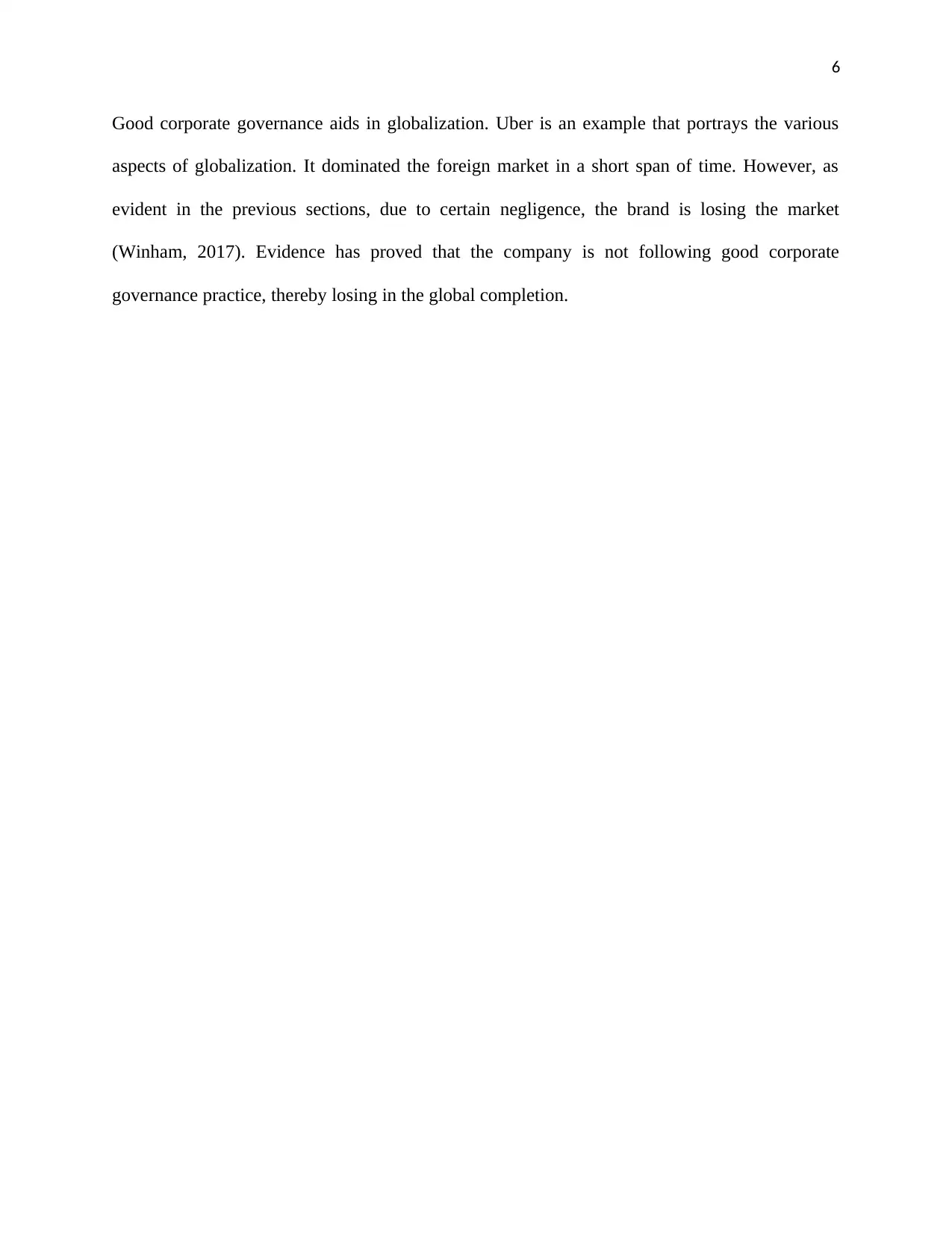
6
Good corporate governance aids in globalization. Uber is an example that portrays the various
aspects of globalization. It dominated the foreign market in a short span of time. However, as
evident in the previous sections, due to certain negligence, the brand is losing the market
(Winham, 2017). Evidence has proved that the company is not following good corporate
governance practice, thereby losing in the global completion.
Good corporate governance aids in globalization. Uber is an example that portrays the various
aspects of globalization. It dominated the foreign market in a short span of time. However, as
evident in the previous sections, due to certain negligence, the brand is losing the market
(Winham, 2017). Evidence has proved that the company is not following good corporate
governance practice, thereby losing in the global completion.
⊘ This is a preview!⊘
Do you want full access?
Subscribe today to unlock all pages.

Trusted by 1+ million students worldwide
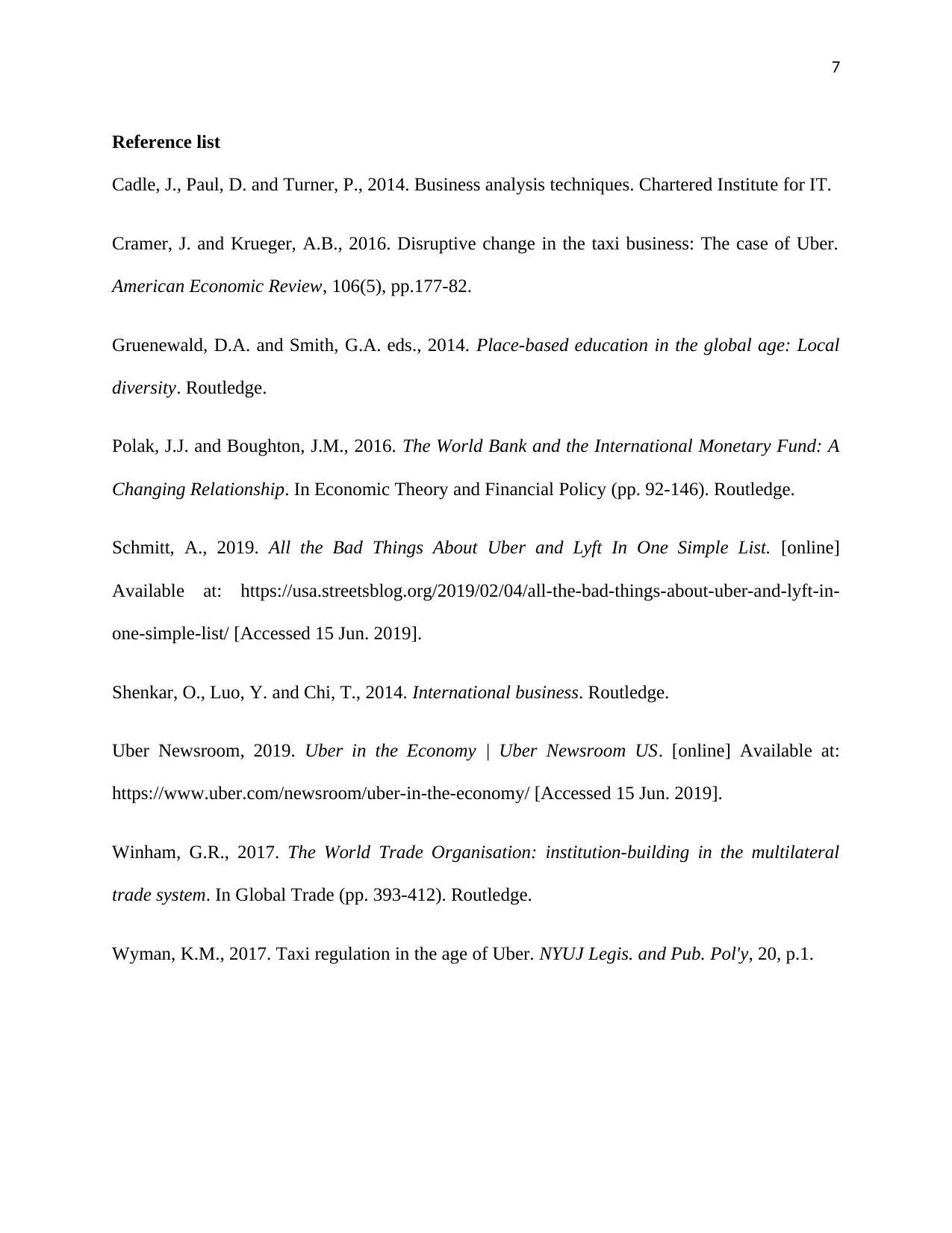
7
Reference list
Cadle, J., Paul, D. and Turner, P., 2014. Business analysis techniques. Chartered Institute for IT.
Cramer, J. and Krueger, A.B., 2016. Disruptive change in the taxi business: The case of Uber.
American Economic Review, 106(5), pp.177-82.
Gruenewald, D.A. and Smith, G.A. eds., 2014. Place-based education in the global age: Local
diversity. Routledge.
Polak, J.J. and Boughton, J.M., 2016. The World Bank and the International Monetary Fund: A
Changing Relationship. In Economic Theory and Financial Policy (pp. 92-146). Routledge.
Schmitt, A., 2019. All the Bad Things About Uber and Lyft In One Simple List. [online]
Available at: https://usa.streetsblog.org/2019/02/04/all-the-bad-things-about-uber-and-lyft-in-
one-simple-list/ [Accessed 15 Jun. 2019].
Shenkar, O., Luo, Y. and Chi, T., 2014. International business. Routledge.
Uber Newsroom, 2019. Uber in the Economy | Uber Newsroom US. [online] Available at:
https://www.uber.com/newsroom/uber-in-the-economy/ [Accessed 15 Jun. 2019].
Winham, G.R., 2017. The World Trade Organisation: institution-building in the multilateral
trade system. In Global Trade (pp. 393-412). Routledge.
Wyman, K.M., 2017. Taxi regulation in the age of Uber. NYUJ Legis. and Pub. Pol'y, 20, p.1.
Reference list
Cadle, J., Paul, D. and Turner, P., 2014. Business analysis techniques. Chartered Institute for IT.
Cramer, J. and Krueger, A.B., 2016. Disruptive change in the taxi business: The case of Uber.
American Economic Review, 106(5), pp.177-82.
Gruenewald, D.A. and Smith, G.A. eds., 2014. Place-based education in the global age: Local
diversity. Routledge.
Polak, J.J. and Boughton, J.M., 2016. The World Bank and the International Monetary Fund: A
Changing Relationship. In Economic Theory and Financial Policy (pp. 92-146). Routledge.
Schmitt, A., 2019. All the Bad Things About Uber and Lyft In One Simple List. [online]
Available at: https://usa.streetsblog.org/2019/02/04/all-the-bad-things-about-uber-and-lyft-in-
one-simple-list/ [Accessed 15 Jun. 2019].
Shenkar, O., Luo, Y. and Chi, T., 2014. International business. Routledge.
Uber Newsroom, 2019. Uber in the Economy | Uber Newsroom US. [online] Available at:
https://www.uber.com/newsroom/uber-in-the-economy/ [Accessed 15 Jun. 2019].
Winham, G.R., 2017. The World Trade Organisation: institution-building in the multilateral
trade system. In Global Trade (pp. 393-412). Routledge.
Wyman, K.M., 2017. Taxi regulation in the age of Uber. NYUJ Legis. and Pub. Pol'y, 20, p.1.
1 out of 7
Related Documents
Your All-in-One AI-Powered Toolkit for Academic Success.
+13062052269
info@desklib.com
Available 24*7 on WhatsApp / Email
![[object Object]](/_next/static/media/star-bottom.7253800d.svg)
Unlock your academic potential
Copyright © 2020–2026 A2Z Services. All Rights Reserved. Developed and managed by ZUCOL.





